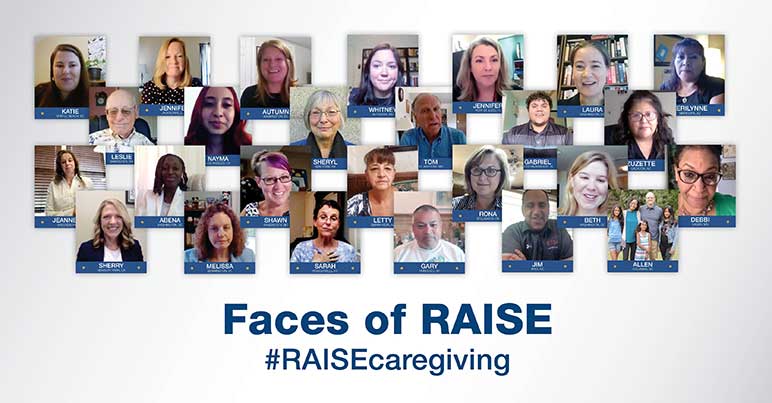Building a National Strategy to Support Family Caregivers
By Eileen J. Tell
Long-Term Care News, November 2021

Family caregivers are the glue holding together the delivery and financing of long-term care (LTC) in the United States. Without their contribution, replacing family caregiving with paid services would cost roughly $470 billion each year.[1] Also, most people strongly prefer receiving care at home. Remaining at home and delaying or avoiding hospital or nursing home placement saves money for families, for private sector payers such as LTC insurers and health plans and for public payers such as Medicaid. The COVID-19 pandemic has created a new urgency and momentum to address family caregiving; it has both highlighted and exacerbated the challenges of such care. Balancing work and family while also being a caregiver is difficult; some caregivers have had to make significant changes to care routines and/or leave the workforce entirely.
Family caregiving covers a broad spectrum of care needs, populations and situations. It includes caring for aging and disabled adults, children with disabilities and special needs, grandparent and kinship caregivers, youth caregivers, chosen family caregivers, long-distance caregivers, and much more. The needs of these caregivers are as diverse as the people for whom they are caring; and the challenges they face change throughout the caregiving journey.
That is why Congress authorized the creation of the RAISE Family Caregiving Advisory Council. Specifically, the Recognize, Assist, Include, Support, & Engage (RAISE) Family Caregivers Act directs the Secretary of Health and Human Services to develop a national family caregiving strategy. The law passed in January 2018. The council comprises family caregivers and experts who have engaged in an in-depth information-gathering and research effort over the last two years to help develop recommendations and an implementation plan for how to address the caregiving crisis. The council has been supported with additional resources, technical assistance and policy analysis by the National Academy of State Health Policy (NASHP) and The John A. Hartford Foundation.
The RAISE council has developed and published recommendations in a newly released Report to Congress. The report’s 26 key recommendations are the first step to developing a national strategy to develop services and supports for family caregivers. The national strategy will outline critical actions that can be taken by public and private sectors to better support family caregivers in ways that reflect their diverse needs, serving as a road map for federal, state and community action.
About the Recommendations
The recommendations are based on the real-life experiences of thousands of family caregivers and the organizations that serve them. The RAISE council collected information from:
- More than 1,600 caregivers and organizations through a Request for Information (RFI) in the Federal Register in December 2019;
- Diverse family caregivers who participated in 12 focus groups over the summer of 2020; and
- Additional focus groups with more than 40 stakeholder organizations serving family caregivers.
Ongoing efforts include key informant interviews with close to 20 professionals playing a critical role in various aspects of serving family caregivers. Additionally, nearly 100 stakeholder groups such as the direct care workforce, county health care providers, employers, aging and disability organizations, faith-based groups, respite care providers and others participated in 16 focus groups over the past few months, offering critical input for the national strategy.
The primary recommendations fall into these broad areas:
- Increasing Awareness of Family Caregivers
- Engaging Family Caregivers as Partners in Healthcare and Long-Term Services and Supports
- Improving Access to Services and Supports for Family Caregivers
- Supporting Financial and Workplace Security for Family Caregivers
- Generating Research, Data, and Evidence-Informed Practices
Broadening Engagement
Many leading organizations informed the council’s development of the recommendations. The Administration for Community Living (ACL) in collaboration with The John A. Hartford Foundation; the National Academy for State Health Policy; RRF Foundation for Aging; the Ralph C. Wilson, Jr. Foundation; National Alliance for Caregiving (NAC); LeadingAge LTSS Center at UMass Boston; Center for Medicare Advocacy; ADvancing States; and Center for Consumer Engagement in Health Innovation at Community Catalyst all contributed to the council’s work. Expert faculty also provided critical support to help inform the recommendations.
Momentum to support family caregivers is shifting as more stakeholders are focused on the issue and recognize the need to support them. Aging, caregiver support, disability, government and advocacy organizations are rallying behind the RAISE recommendations in recognition of a deep need for a national strategy that supports family caregivers.
It is important to further expand awareness and engagement in the process of moving these recommendations into concrete action steps. Long-term care insurers can learn more about what family caregivers need and help expand the services and supports available to them; this will ultimately benefit the insured experience. Policymakers at the federal, state and local levels—as well as the private sector, including employers, health care systems and service providers—also need to work together to support these critical caregivers. Policymakers should consider the RAISE Act recommendations and support family caregivers by helping to fund and execute these evidenced-based recommendations.
Where Can I Learn More?
Here are some links to the materials from the RAISE Family Caregiving Advisory Council:
- Recognize, Assist, Include, Support, & Engage (RAISE) Family Caregivers Act “Initial Report to Congress” prepared by the RAISE Family Caregiving Advisory Council with assistance from the ACL, an operating division of the U.S. Department of Health and Human Services
- “In Their Own Words: Family Caregiver Priorities and Recommends—Results from a Request for Information”
- “What Family Caregivers Need: Findings from Listening Sessions”
- Videos of Caregiver Voices
Statements of fact and opinions expressed herein are those of the individual authors and are not necessarily those of the Society of Actuaries, the editors, or the respective authors’ employers.
Eileen J. Tell, MPH, is the CEO of ET Consulting, LLC, and fellow of the Gerontology Institute, McCormack Graduate School of Policy and Global Studies at the University of Massachusetts. She can be reached at eileenjtell@gmail.com.

